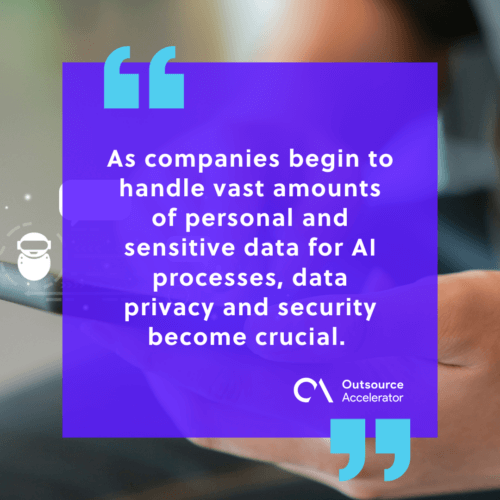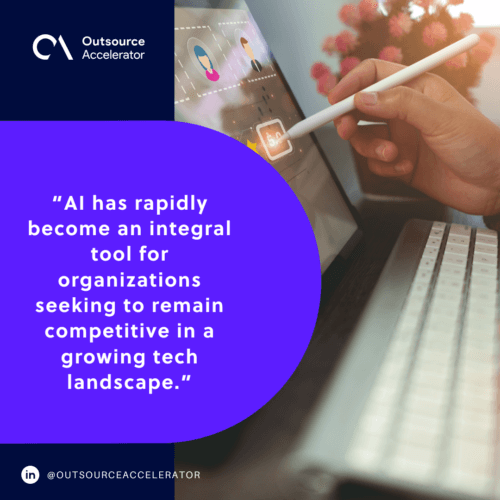Top 5 AI adoption challenges to consider

The integration of artificial intelligence (AI) into business operations has shifted from a futuristic ambition to an essential element for growth and innovation.
Companies across industries are increasingly exploring AI’s potential.
However, AI adoption comes with significant challenges that can hinder the success of these initiatives if not properly addressed.
Understanding these challenges and preparing for them can mean the difference between wasted resources and a transformative outcome.
This article highlights the significance of AI adoption, common challenges businesses face, and how partnering with Acquire Intelligence (formerly Acquire BPO) can facilitate a smoother AI adoption process.
The significance of AI adoption
AI has rapidly become an integral tool for organizations seeking to remain competitive in a growing tech landscape. This tech innovation has been able to:
- Automate repetitive tasks
- Offer real-time data analytics
- Enable predictive modeling
These all contribute to allowing businesses to operate more efficiently.
From retail to healthcare, the ability to leverage data at scale has turned AI into a key driver of revenue and customer satisfaction.
However, its significance is paired with complexity. Businesses often face obstacles in their AI adoption journey.
Recognizing and navigating these challenges becomes crucial to reaping its full benefits.
5 challenges of AI adoption
Despite the opportunities AI presents, businesses face several major challenges when implementing AI solutions.
Each of these obstacles can impact the project’s success if not addressed from the outset:
1. High initial costs and resource allocation
Implementing AI technology often requires a substantial initial investment. This covers not only purchasing software but also the infrastructure to support it.
Many businesses underestimate the associated costs. These can include advanced data storage solutions, powerful processors, and cloud services for processing large datasets.
Allocating resources to AI while managing other business needs often becomes a delicate balancing act, especially for companies with limited budgets.
2. Skill gaps and talent shortages
AI adoption requires specialized skills in machine learning, data analysis, and AI model development. These may be difficult to source in the current talent market.
Many companies face skill gaps within their existing workforce and may struggle to recruit or train staff proficient in AI-related skills. This lack of expertise can hinder AI development and implementation, making it difficult for companies to fully benefit from their AI initiatives.
3. Data quality and accessibility
For AI systems to function effectively, they need access to high-quality, relevant data. Inconsistent, incomplete, or outdated data can result in flawed insights and poor decision-making.
Many companies also face challenges related to data silos, where valuable information is isolated across departments. Integrating these data sources is crucial but often complex, involving significant time and technical expertise.
4. Privacy and security concerns
As companies begin to handle vast amounts of personal and sensitive data for AI processes, data privacy and security become crucial.
Striking a balance between data usage and compliance with regulations like GDPR or HIPAA can be challenging, especially in industries like finance and healthcare.
AI systems are also at risk of cyber threats. They can be vulnerable to data breaches, malicious manipulation, and other attacks if security protocols are not robust.

5. Measuring and demonstrating ROI
Measuring the return on investment (ROI) from AI initiatives can be difficult due to the complexity and long-term nature of AI projects.
Some benefits of AI, such as enhanced decision-making or improved customer satisfaction, are qualitative and hard to quantify.
Businesses may also face pressure to justify continued AI investment to stakeholders. Without clear metrics and KPIs, assessing AI’s impact becomes an ongoing challenge that can lead to disillusionment if expectations are not met.
Acquire Intelligence’s collaborative approach to AI adoption
For companies looking to mitigate these challenges, collaborating with a firm like Acquire Intelligence can make the AI adoption journey more manageable.
Acquire Intelligence offers access to skilled professionals who specialize in AI, reducing the talent gap and bringing expertise to the table. This partnership allows companies to take advantage of seasoned AI talent pool and resources without the need for extensive in-house hiring or training.
Acquire Intelligence addresses these challenges, empowering companies to harness the benefits of AI effectively.
Partner with Acquire Intelligence and set a solid foundation for successful AI adoption!








 Independent
Independent




